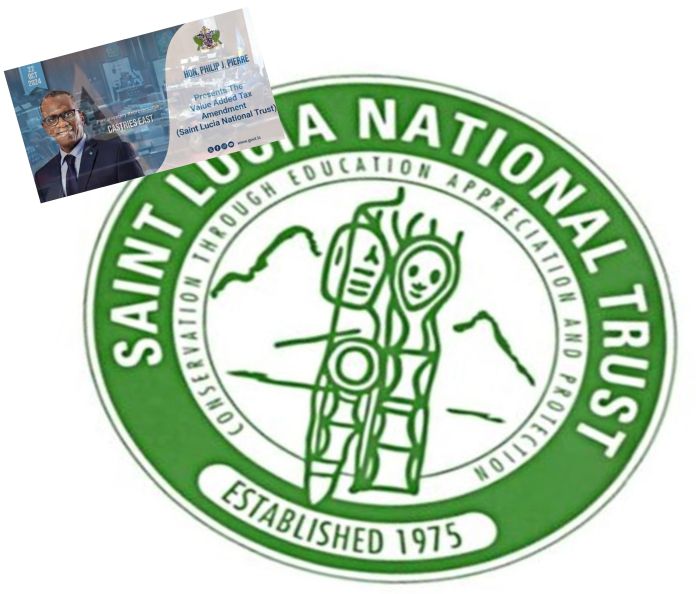By Caribbean News Global contributor
GROS ISLET, St Lucia – The parliament of Saint Lucia on October 15, 2024, and the senate on October 24 have both by affirmative resolution, approved the draft Value Added Tax (Amendment of Schedule 3) (No.4) Order which amends Schedule 3 of the Act to include as an exempt import or local supply, the import or local supply of goods and services by the Saint Lucia National Trust, (The Trust).
The parliament of Saint Lucia and government policy formulation follows the reinstatement of an annual subvention of XCD700, 000. (084 Policy Planning & Administrative Services – PM Office)
[The standard VAT rate in Saint Lucia is 12.5 percent, implemented in 2012]. A 2.5 percent Health and Citizen Security Levy was implemented in 2023. VAT is charged at the rate of 15 percent].
‘The Trust’ in a press release on October 28, said it is “grateful for our recent inclusion in the list of VAT-exempt organizations and assure the public that this fiscal relief will directly support our nation’s heritage conservation efforts.”
In that regard, the explanations and operations of ‘The Trust’ have done little to explain and update, the inquiries that the public most require, “given that our patrimony is not exactly our chequebook.”
Furthermore, in the protection of cash flow, ‘The Trust’ has a responsibility to work with the people of Saint Lucia; striking a balance in the development of the country, while permitted to operate in an environment free of fear and from fear, says Prime Minister, Philip J. Pierre presenting the Value Added Tax Amendment (Saint Lucia National Trust).
Commitment to transparency
‘The Trust’ explained that their commitment to transparency is reinforced by “statutory obligations,” and “financial records, which are audited annually by qualified professionals. These audited statements are presented to both our Council and membership at the annual general meeting, and subsequently submitted to the prime minister and the Parastatal Monitoring Department,” according to the statutory body dedicated to preserving Saint Lucia’s heritage.
Revenue through various channels
‘The Trust’ further advised: “To fulfil our conservation mandate and obligations under both the Trust Act and the Pigeon Island National Landmark lease, we generate revenue through various channels: grants, donations, membership and entrance fees, facility rentals, and government subvention.”
Use of government annual subvention of XCD700, 000
To the surprise of many ‘The Trust’, established on September 26, 1975, by Act of Parliament (a statutory body) to preserve Saint Lucia’s heritage – from natural landscapes and marine environments to [our] historic buildings and cultural sites, announced:
“The government subvention represents 35 percent of our revenue, with 70 percent of these funds specifically allocated to subsidizing entrance fees for Saint Lucian residents at Pigeon Island National Landmark.”
“It’s worth noting that even during the challenges of the COVID-19 pandemic, when our revenue was significantly impacted by reduced international visitors, we maintained subsidized access for residents to Pigeon Island National Landmark, despite receiving no subvention,” ‘The Trust’ explanatory press release emphasised.
Statutory bodies’ legislative equivalence
If that’s the case, “ this is not realistic and progressive, and requires serious governance and policy reformulation,” said a regional economist. “The aggregate value of primary incomes (revenue) seems disproportionate, if not ostensible unsustainable.”
Moreover, concerns about ‘The Trust’ were amplified on social media.
“Well well well, after all, ‘The Trust’ is still alive after three years missing in action. They decide to come back from the dead.” […]
“ In the culture where I grew up, you get rewarded for hard work and proof of work, but [what] I see ‘The Trust’ [is] trying to justify a reward for no work.”
“Down with people who only speak out based on political expedience!”
The government VAT-exempt policy for ‘The Trust’ has opened the door for other statutory bodies to make demands for the same legislative action. This also raises inquiries and broader policy arguments vis-à-vis tax legislation, exemptions/concessions and VAT legislation.
Understanding the metaphor and philosophy of colonial contagion in 2024 is nothing short of predictable.
The trend lines and concerns of ‘The Trust’ explanatory press release on October 28-toting its establishment September 26, 1975, by Act of Parliament (a statutory body) suggest it has ostensibly expired pre-independence (February 22, 1979) practicability and needs streamlining, and modernization, considering that ‘The Trust’ – “maintains ongoing dialogue with the government of Saint Lucia, national agencies, and various organizations to identify optimal approaches for heritage conservation and sustainable resource management.”





